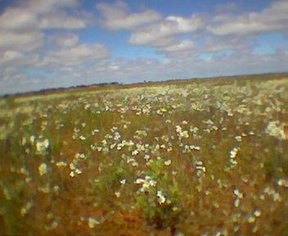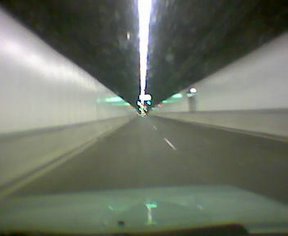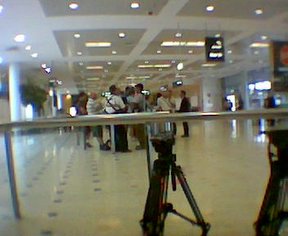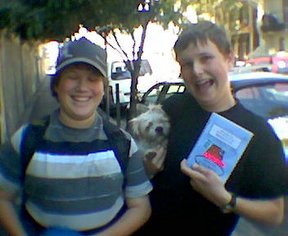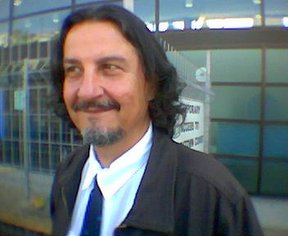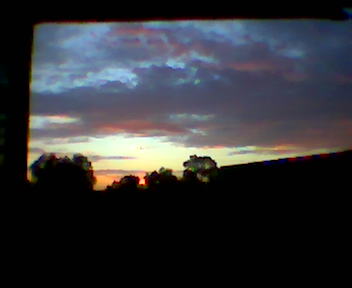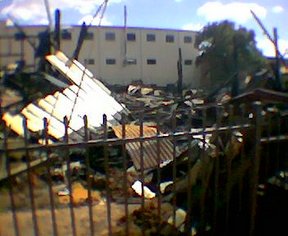
This is all that remains of the historic 1920s Victory Hall, next to the Uniting Church in Auburn, which was burnt to the ground in the early hours of the morning this week. Police are treating the fire as suspicious.
Not far around the corner, only a few hundred metres away, all the windows along the front of St Thomas' Anglican Church, which has a primarily Chinese congregation, had all its front windows smashed. Church workers busily cleaning up the broken glass refused to cast blame. And not far away, at the Catholic church and primary school of St Joseph the Worker, shots were fired at the building during choir prasctice on Monday night.
Catholic, Anglican and Uniting church facilities have been torched, attacked or shot at in Sydney's Islamic heartland of Auburn during a 48 hour.
All day people stopped to inspect the damage. It was hard to tell whether they were stopping to gloat or shake their heads in sorrow. Or that not much happened around here.
It was impossible to get even the slightest tinge of inflammatory rhetoric from the Uniting Church, who were burdened in their own conflicts. Anger was not on the agenda.
Both Uniting Church leaders and those from the Islamic school literally next door, said of all the places that could be targetted Victory Hall was the worse; for there had been good cooperation and understanding between muslims and Christians in the area for years. The Uniting Church regularly let out the hall to the Islamic school known as the Al-Faisal College.
Reverend Glenys Biddle described the smoldering ambers of the once busy hall as ``very very sad''. "People who went to Sunday school as kids have been coming by all day. One woman told me the building held the memory of a woman who was significant in her faith journey, but is no longer around. That is sort of thing that has been lost with the building."
Rev Biddle said Islamic leaders had been by throughout the day to express their condolences and assure them they wanted to continue to be good neighbours. ``It has been a very good relationship,'' she said.
Principal of the Al-Faisal College Shafiq Khan nextdoor said Christians and muslims had worked amicably nextdoor to each other and the loss and the fear it may promote in the community was a loss for both muslims and christians. "We have been neighbours for 20 years the christian, since we bought this place," he said. "They come to us, we go to them. There was no distinguishmenet between who believed what. They used our place and we used theier place, we lived like good brother and sister. This is a crime against peace, the community and the country, a crime against harmony and against our children, who used the hall."
A police spokeswoman refused to draw a connection between the Cronulla riots and the incidents in Auburn but were treating the fire as suspicious. No one was casting the first stone.
While the parishioners agonised over the correct expression of faith, church leaders from all sides found little difficulty in their easy dialogue. In wrestling with God, the tiny niceties had little home.
Rev Dr Dean Drayton, President of the Uniting Church in Australia, said the burning of the hall had happened "at a time of heightened fear" but was eager to calm things down. If it had been intentional, it was impossible to know whether or not the Islamic school had also been their target. Although the Islamic school was clearly safe and the hall was clearly gone; right to the edge of the building. The last thing he was interested in was subtlety. The thirty somethings all thought they knew everything. He longed for a resolution, the tree change they all talked about, as if it was possible. And the smarmy little twirps kept increasing their powers.
The riots have opened vissures in the debate; allowed finally people to talk about things they had long wanted to avoid, and brought out the pundits on all sides.
Here's a small sample of what some of the leading figures have had to say.
As talkback radio ran hot and reasoned voices vanished,
Mike Steketee wrote:
"What the riots prove is not that multiculturalism has failed, but that there has not been enough emphasis on it. Its whole purpose is to avoid just these sort of situations by developing greater understanding and tolerance. That should include exploring and addressing the alienation of young Lebanese men.
"Those who know them say that many Lebanese Muslim families have low expectations... Unemployment rates are high, as is the consequent resort to crime. Few young Lebanese are motivated by fundamentalist Islam. But the demonisation of Muslims in the age of terror adds one more ingredient to a volatile mix."
Here's some of what the well known former policeman Tim Priest had to say:
"If the police and the state Government are to learn anything from Sunday's riots, it is this: people largely do not believe what comes out of the mouths of senior police and government ministers.
Of course, the usual claque of agenda-driven ethnic community leaders were quick to condemn the Cronulla incidents as un-Australian and racist. Never mind the multitude of racist attacks on young Australian men and women during the past decade, which have now manifested into full-blown racial retaliation."
He went on to say:
"The crime problems evident in southwest and southeast Sydney resemble a medical condition like skin cancer: they are relatively painless and easy to cure in the early stages, but if left untreated they require painful and radical surgery to cure. Sunday's events are the start of what could become a long, drawn-out war of racial and social division that may be harder to cure than any of us can imagine. If we addressed the problem a decade ago when it first appeared, we may never have seen what we witnessed on Sunday."
Then former head of the Australian Broadcasting Association Professor David Flint got in on the act, writing a piece in favour of the shock jocks and the uncensored. uncomfortable voices of democracy in the raw.
He wrote:
"Now among the favoured policies of the elites is the doctrine of multiculturalism. A Humpty Dumpty word, multiculturalism means whatever the user chooses it to mean, neither more nor less. If it is used in the sense requiring tolerance - and treating all Australians of whatever colour, religion or ethnic background in identical ways - then it is superfluous. Australians had already achieved that with the waves of migration after World WarII and well before they had ever heard that word, multiculturalism.
If it is used to mean that people should be classified and then advantaged or disadvantaged according to some ethnic tag, or that the essential principles and values of our Australian culture must give way, this is unacceptable to most Australians.
Australians have never agreed to this and they never would. The problem is, they have never been asked. No wonder they recorded their vehement opposition to the doctrine on one of the few places where this was tolerated: talkback radio."
Heavyweight historian Keith Windschuttle, author of The Fabrication of Aboriginal History, also through his considerable frame into the debate, declaring that Cronulla was not a race war but a clash of cultures.
"It was inevitable, given the prevailing mind-set within government and the media, that Sydney's beachside violence this week would be called race riots.The New South Wales Premier, his ministers and many newspaper headlines all used the term. However, a more ungainly but nonetheless more accurate description would have been multicultural riots. For the doctrine of multiculturalism is really to blame..."
IRAQ WATCH:
From the UK Financial Times:
"Iraqi officials were yesterday counting votes for the first post-invasion parliament and investigating allegations of violations, including the intimidation of voters, in a process that may determine how much legitimacy Sunni Arabs accord the country's nascent democracy.
"An official with Iraq's Independent Elections Commission said that between 10m and 11m voters may have cast ballots, or between 65 and 70 per cent of registered voters. Turnout has been particularly high in Sunni areas... "


















